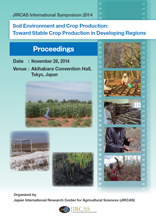Closing Remarks

In your program Dr. Yasunaka, Vice President of JIRCAS, is printed. However, he had to go back to Tsukuba
for urgent matter. So, I am his substitute and I hope it’s a reasonable substitute. Normally I open as a president
any event and he normally closes event, including drinking party, but today I have to do both.
When we started the plan of this symposium, soil science is highly focused. So, we’re not sure how many
audience we can get, but I had a high hope that we can get good number. So, I gave organizer, especially Head
of Public Relations, 150 is our target. However, according to my data, I got just 10 minutes ago, we had 158
participants.
Today, it has been very successful day. We had a series of excellent presentations, starting from keynote
speakers and other scientific presentations, followed by penetrating, but still polite questions. So, we had a very
successful event. Also, concluding session, we heard many useful suggestions; for example, importance of
multidisciplinary approach. Also, from Dr. Kosaki that we shouldn’t look for single simple solution, we have
to have tolerance to accept second best or third best dealing with soil problems. I think that is the reality. With
incremental improvements, we can address soil issues.
Today’s symposium reminded me or reminded us of the paramount importance of soil and soil fertility. Without
better and sustainable management of soil fertility, there is no future of food security. In English, often we say
that when we are taking some risk, we are walking on thin ice. Our humanity and whole ecosystem depends on
very thin surface soil, 15 centimeters or 20 centimeters. So our life as humanity and entire ecosystem depends
on thin soil, which really we have to look after.
I am also a scientist so always I look for money and I can make a good argument. How much world community
is spending for space science; billions of dollars, but soil science a little. If you ask your kids or children, some
will say that in the future they’d like to be astronauts or space science specialists, but no kid say that they’d like
to be a soil scientist. But if you look at the real importance, I don’t say that space science is not important. But
looking at really our needs to have a firm ground on thin soil surface, we need to invest more for soil science. I
think that’s the real reason why United Nations has chosen next year as International Year of Soil.
I’d like to take this opportunity to thank speakers, chairs and those asked the questions. Sometimes asking
question is more difficult than delivering a lecture. It requires courage. Giving a lecture, it requires preparation.
But asking question, it requires courage. Also, I take this opportunity to thank four co-organizers of this
symposium. Also, I’d like to thank people who contributed to logistics, the company we hired for logistics, and
good audiovisual arrangement. Also, of course, to translators, particularly we utilized English as a formal
language for today’s event. But none of speakers, including myself, is a native English speaker and you
translated quite well, addressing a different grade and shade of accent. Also, I’d like thank you to JIRCAS staff.
Normally I don’t say any word appreciating my own staff, but I think they have done quite well and I hope that
you agree with that. And a good program and identifying good speakers.
This is my last point. This is my concluding remark and thanking your participation. And really my hope is
that today’s event becomes a key for stimulating our thinking of our importance of soil science and soil health,
and plant nutrition and interaction with other discipline. Also, this even is a trigger for our enhanced partnership.
Thank you very much for your participation.
| 刊行年月日 | |
|---|---|
| 作成者 | Masa Iwanaga |
| 公開者 | Japan International Research Center for Agricultural Sciences |
| オンライン掲載日 | |
| 号 | 2014 |
| 開始ページ | 156 |
| 終了ページ | 156 |
| 権利 | Japan International Research Center for Agricultural Sciences |
| 言語 | eng |
